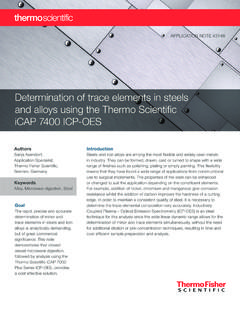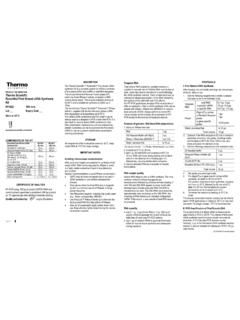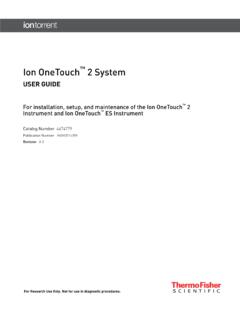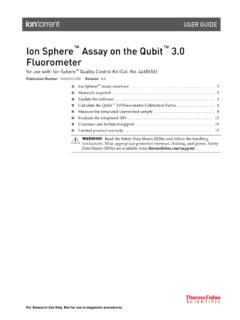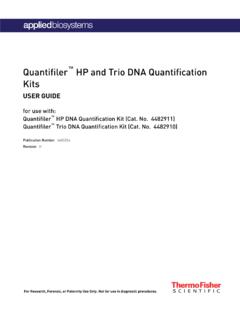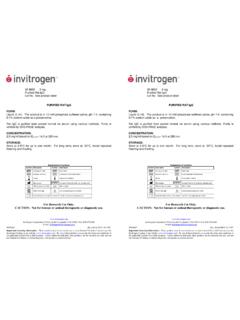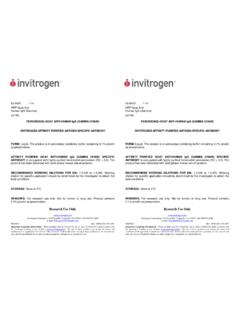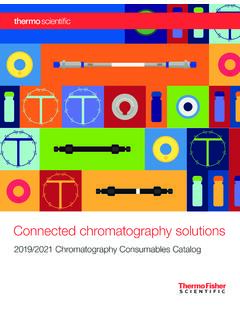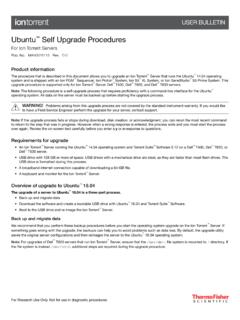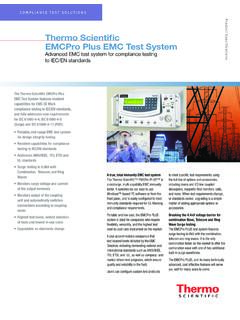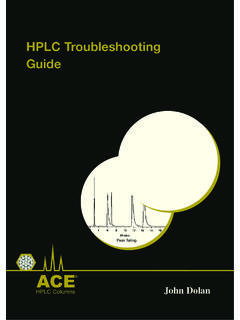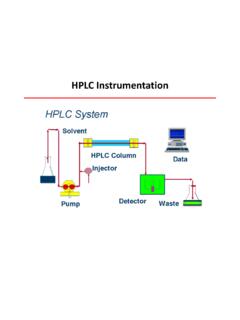Transcription of Tips and Tricks for HPLC and UHPLC
1 The world leader in serving science hplc Tips and Tricks Tiziana Ladisa Sales Support Specialist for Chromatography Italy Thermo Fisher Scientific, Rodano (MI) 2 Overview Thermo Scientific Vanquish UHPLC system Thermo Scientific UltiMate 3000 UHPLC system 3 Common Recommendations Mobile Phase 4 Common Problems: Mobile Phase Solvent compatibility Try to use pre-mixed solvents Add 5-10% of organic eluent to the aqueous eluent Add 5-10% aqueous eluent to the organic eluent Avoids local crystallization in the pump (with buffers) Eluents with salt buffers Change eluents with salt buffers regularly Filtrate buffers Use water with 18,2M Ohm AND <5ppb TOC 5 TN140: Solvent Quality The quality of the eluent is very important to keep the noise as low as possible Make sure that the eluents are good by running them without injection (sample type "Blank ) For MS and Thermo Scientific Corona charged aerosol detector only use volatile buffers Solvent Quality UV-spectra at 200 250 nm of two methanol samples (both LC/MS grade) 6 Common Recommendations: Mobile Phase Symptoms Peaks shift Loss of resolution Causes Mobile Phase pH changes Prevention Use correct buffer for pH range Control pH of mobile phase Maintain buffer strength in aqueous phase Control temperature pH pH 7 Common Problems.
2 Mobile Phase The two chromatograms illustrate the effect of a small reduction (3 mM) in buffer concentration on the separation of six food additives: Symptoms Peaks shift Loss of resolution Causes Mobile Phase buffer strength changes Prevention Maintain buffer strength in aqueous phase. Control temperature. Filter solvents rather than using vacuum degassing. 60 mM 57 mM 8 The Pump Common Recommendations 9 Pump Types LPG pump type Eluent composition at the low pressure side => Before the pump head Eluent is composed through proportioning valves Eluent segments pass working and equilibration cylinder Up to four solvents can be mixed HPG pump type Eluent composition at the high pressure side => Behind the pump head Pure solvents pass working and equilibration cylinder Eluent mixture is prepared with two pump blocks => Binary eluent mixture only 10 10 Peaks in 10 Seconds with a Ballistic Gradient Peak number 1 2 3 4 5 6 7 8 9 10 Retention time RSD [%] Retention time SD [ms]
3 Seconds 0 6 12 Overlay of 6 consecutive runs 1 2 3 6 4 5 7 8 9 10 Test conditions Column: C18, 30 x mm, m Eluents: A: Water B: Acetonitrile Flow: mL/min @ 725 bar (10,500 psi) Temperature: 100 C Inj. volume: 1 L Te s t mixture: Uracil and 9 alkylphenones Resolution (Critical Peak Pair): HPG-3200RS 11 The Comprehensive SpinFlow Mixer Portfolio Range of static mixers suitable from low-GDV LC-MS application to high-sensitive TFA application 12 Effects of Different Mixers These samples were run with the same Vanquish Horizon system, the only change was the size of the mixer Flow 0,250 l/min A: ( TFA, 50 mM NaCl):MeCN 95:5. B: ( TFA, 50 mM NaCl):MeCN 30:70 Black 10 l mixer Blue 350 l mixer 13 Easy Tunable for Optimum Application Performance For fast separations where the mixing ripple does not interfere with the detection ( , Corona CAD or MS detectors), use the low mixer volumes (35 L, 100 L).
4 Use the medium sized mixers (200 L, 400 L) as the best balance between fast separation and low mixing ripple in UV detection. For highest sensitivity and when mixing ripples interfere with the detection ( , due to use of UV-absorbing solvents), use a larger mixer volume (400 L, 800 L). For UV-absorbing solvent additives that amplify the mixing ripples by interaction with the stationary phase ( , TFA application), use for highest sensitivity the largest mixer volumes (800 L, 1550 L). 14 Air bubble stuck in the pump Prime the pump Degas the eluents 5 min in an ultrasonic water bath Prime and Degas _ ___ p_barmin7654321 15 Practical Use of a hplc Pump Use eluent filters if necessary Use a degasser It might be a good idea to degas in an ultrasonic water bath for 5 min Seal wash helps the pump seal to survive If the pump is out of wash solution it should not start If the pump starts to leak Thermo Scientific Chromeleon chromatography data system (CDS) will give a warning 16 Autosampler Common Recommendations 17 Autosamplers Before you run samples flush the syringe Even a tiny air bubble ruins the performance.
5 Autosamplers need a transport liquid. Usually eluent A is connected to the sampler and the pump. It is possible to use a separate bottle of transport liquid. The transport liquid is used to wash the needle. 18 Important Parameters DrawSpeed Defines the speed at which the sample is drawn by the syringe In analytical range (5 - 100 L) a draw cycle should normally take 3 - 4 seconds. At lower volumes, a draw cycle should take approximately 10 times longer. Examples (normal hplc eluents and samples dissolved in starting eluent) => 10 L injection volume -> recommended draw speed: 2 - 3 L/sec => 2 L injection volume -> recommended draw speed: - L/sec Draw speed has to be adapted in case of samples and eluents with higher viscosity.
6 Incorrect setting is frequently responsible for area precision problems. 19 Sample Solvent Matching injection volume with solvent strength Ideally the sample solvent will not affect chromatographic separation. If a stronger sample solvent is required, injection volumes should be kept to a minimum. In a strong solvent, the sample moves more quickly through the mobile phase and often split or distorted peak shapes are observed as in chromatogram A. The syringe is usually connected to eluent A. A. 20 Vials and Septa Do not overfill the vial The septum is used to clean the needle. Fill 2/3 of the volume. If you use inserts make sure there are no airbubbles in them. Autosamplers with PEEK (Victrex Plc.)
7 Needle must have caps with slit septa. Never shake the vial. If you do there is going to be sample on the underside of the septum which gives carry over. Adjust the needle height according to the vial dimensions. Rubber septas get dry and can block the injector.. and use the vial and septum only once! 21 Column Compartment Common Recommendations 22 Pre-column Heater Serpentine-shaped capillary embedded in aluminum block Different types available 2 L, ID 7 L, ID 11 L, ID 23 60 C 60 C 60 C Column oven 40 C 60 C Pre-column Heater Column oven Without pre-heating: Poor peak resolution Peak broadening Peak splitting Extended analysis time 24 Pre-column Heater 1 Methyl-Paraben 2 - Hydrocortisone 3 Propyl-Paraben With pre-column heater Without pre-column heater 1 2 3 0 1 2 3 4 5 6 7 8 9 10 Minutes 25 UV-Detectors Common Recommendations 26 Operating Principle Variable Wavelength Detector (VWD) Forward optics design Only the selected wavelength passes the flow cell and is detected by the sample diode.
8 A part of the light beam is redirected to the reference diode. Reference signal is not influenced by the content of the flow cell. True reference Light source Dispersion device Flow cell Sample diode 27 Recommended Parameters: Reference Wavelength DAD Reversed optics design Light beam passes the flow cell before being diffracted No true reference signal can be obtained Instead -and with limitations-, any diode or bunch of diodes can be selected as a reference If selected reference and acquisition wavelength are the same, the resulting signal would be zero (0) As a consequence either don t use a reference (preferred) or select a reference wavelength in a quiet area of the spectrum (where little absorbance occurs)
9 Reference wavelength range should not interfere with absorbance range of any compound of interest Light source Flow cell Dispersion device Diode array 28 Flow Cell Volume Flow cell volume depends on peak volume. Rule: Flow cell volume should not exceed 10% of the peak volume. Flow cell ok Peak Volume Cell volume Flow Flow cell too big Micro column peak volumes Flow cell ok Micro column peak volumes Note: Besides lamp age the light intensity is highly dependent on the installed flow cell. Smaller cell volume Less light is passing through the flow cell. 29 Diode Array Detector Bandwidth S/N ratio Spectral resolution Slit width Baseline noise Spectral resolution Slit width Bandwidth Bandwidth and Slit width Slit defines optical resolution and therefore minimal physically meaningful bandwidth.
10 VWD detector: Bandwidth is defined by entrance slit. 30 Setting Bandwidth Bandwidth 4 nm s/n = 5 Bandwidth 30 nm s/n = 25 Narrow bandwidth gives fewer stray light errors but lower sensitivity. 4 x light = < noise 31 Recommended Parameters: Data Acquisition 250 250 0,100 0,105 0,110 0,115 0,120 0 50 100 150 200 Absorbance [mAU] t [min] 0,100 0,105 0,110 0,115 0,120 0 50 100 150 200 Data rate: 5 Hz t [min] Absorbance [mAU] Data rate: 100 Hz Too few data points effect peak form, reproducibility and area precision. A minimum of 20, ideally 30-40 data points/peak are required. 32 Time Constant The rise time (Response time) is closely releated to the time constant: Rise time = 2,2 x Time constant The parameter is a measure of how quickly the detector responds to a change in signal.
